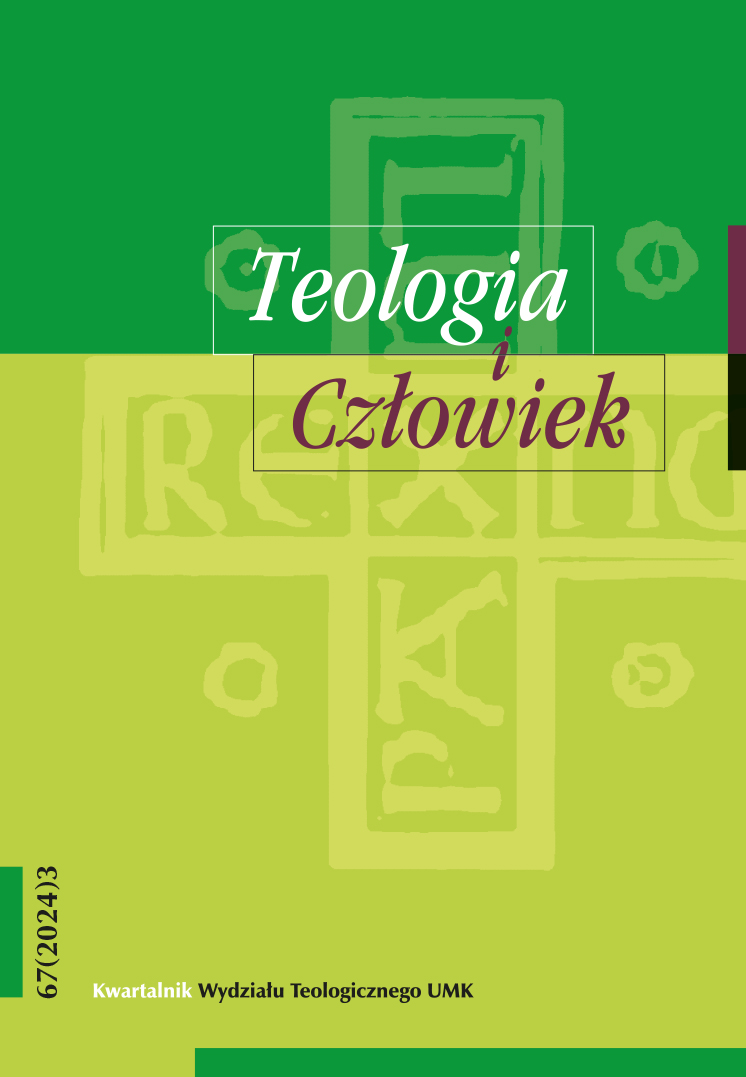“Voluntary and Unlawful Abandonment of the Sacred Ministry” in the Light of the Revised Provisions of Canon Penal Law in the 1983 Code of Canon Law
DOI:
https://doi.org/10.12775/TiCz.2024.018Keywords
ecclesiastical offence, amendment of canon penal law, abandonment of the sacred ministry, criminal sanctions, suspension, expiatory penaltiesAbstract
The article aims to familiarize the reader with the legislative actions of the Pope. It is noteworthy that since the promulgation of the 1983 Code of Canon Law (CIC/83), no other amendment has been made to penal law that would be comparable in scale. Based on an analysis of Canon 1392 of the CIC, which was carried out to show the positive effects of the amendment, the article describes in detail the issue of interest. The author’s aim is to show the abandonment of the sacred ministry as an offence. Accordingly, key concepts are explained, and an analysis of the subject and object dimensions of the offence is carried out. Furthermore, in the last part of the study, criminal sanctions and actions of the ecclesiastical authority are presented. Various research methods have been used to create the narrative, including the dogmatic-legal method, the historical-legal method, the philological method, the analytical method, and the synthetic method.
References
Sources
“Codex Iuris Canonici Pii X Pontificis Maximi iussu digestus, Benedicti Papae XV Auctoritate promulgatus.” Acta Apostolicae Sedis 9/II (1917): 2–593.
“Codex Iuris Canonici auctoritate Ioannis Pauli PP. II promulgatus.” Acta Apostolicae Sedis 75/II (1983): I–XXX, 1–324. Tekst polski: Kodeks Prawa Kanonicznego. Przekład polski zatwierdzony przez Konferencję Episkopatu. Warszawa 2021.
Congregazione per il Clero. Lettera circolare prot. N. 20100823, 17.03. 2010.
Congregazione per il Clero. „Lettera circolare prot. N. 20090556, 18.04.2009.” Revista Española de Derecho Canónico 67 (2010): 391–400.
Papieska Rada do spraw Tekstów Prawnych. „Nota wyjaśniająca na temat zakresu odpowiedzialności biskupa diecezjalnego w stosunku do prezbiterów inkardynowanych do diecezji.” Communicationes 36 (2004): 33–38.
Literature
Astigueta, Damian Guillermo. „Facolta concesse alla Congregazione per il Clero.” Periodica 99 (2010).
Barszcz, Waldemar. „Przyczyny i procedury przeniesienia duchownych do stanu świeckiego na podstawie uprawnień Kongregacji ds. Duchowieństwa.” Prawo Kanoniczne 54, nr 3–4 (2011).
Bączkiewicz, Franciszek. Prawo kanoniczne. Podręcznik dla duchowieństwa. Opole: Wydawnictwo Diecezjalne św. Krzyża, 1957.
Borek, Dariusz. Concursus in delicto. Formy zjawiskowe przestępstwa w kanonicznym prawie karnym (studium prawno-historyczne). Warszawa: Wydawnictwo UKSW, 2014.
Botta, Raffaele. La norma penale nel diritto della Chiesa. Bologna: Il Mulino, 2001.
Calabrese, Antonio. Diritto penale canonico. Città del Vaticano: Libreria Editrice Vaticana, 2006.
Cito, Daniele. „Nota al m.p. Sacramentorum sanctitatis tutela.” Ius Ecclesiae 14 (2002).
D’Auria, Andrea. L’imputabilita nel diritto penale canonico. Roma: Pontificio Instituto Biblico, 1997.
de Paolis, Velasio. De sanctionibus in Ecclesia. Adnotationes in Codicem. Liber VI. Roma: E.P.U.G., 1984.
de Paolis, Velasio. Le sanzioni nella Chiesa Commento al. Codice di Diritto Canonico. Libro VI. Roma: Urbaniana University Press, 2001.
Janczewski, Zbigniew. Ustanawianie Szafarzy świętych sakramentów w Kościele łacińskim i Kościołach Wschodnich. Warszawa: Wydawnictwo UKSW, 2004.
Kaleta, Paweł. „Przestępstwa przeciwko specjalnym obowiązkom.” W Komentarz do Kodeksu Prawa Kanonicznego. Księga VI. Sankcje Karne w Kościele zreformowane przez papieża Franciszka, t. IV/2, red. Józef Krukowski. Poznań: Pallottinum, 2022.
Krukowski, Józef. „Obowiązki i uprawnienia duchownych. Komentarz do kanonu 283 KPK.” W Komentarz do Kodeksu Prawa Kanonicznego. Księga druga. Lud Boży, t. II, red. Józef Krukowski. Poznań: Pallottinum, 2005.
Leszczyński, Grzegorz. „Pojęcie poczytalności w prawie karnym kościoła.” Prawo Kanoniczne 47, nr 1–2 (2004).
Michiels, Gommarus. De delictis et poenis, commentarius libri V Codicis Iuris Canonici, vol. I. Parisiis– Tornaci–Romae–Neo Eboraci, 1961.
Pawluk, Tadeusz. Prawo kanoniczne według Kodeksu Jana Pawła II. Lud Boży i jego nauczanie i uświęcenie. Olsztyn: Warmińskie Wydawnictwo Diecezjalne, 1992.
Phingin, Bruno Fabio. Diritto penale canonico. Venezia: Marcianum Press, 2008.
Phingin, Bruno Fabio. Il nuovo sistema penale della Chiesa. Venzia: Marcianum Press, 2021.
Rincón-Pérez, Tomás. „Księga II Lud Boży. Tytuł III – Święci szafarze, czyli duchowni. Komentarz do kanonów 273 274 KPK.” W Codex Iuris Canonici. Kodeks Prawa Kanonicznego. Komentarz. Powszechne i partykularne ustawodawstwo Kościoła katolickiego. Podstawowe akty polskiego prawa wyznaniowego. Edycja polska na podstawie wydania hiszpańskiego, red. Piotr Majer. Kraków: Woulters Kluwers, 2011.
Sacra Congregatio Concili. „Litterae Circulares ad omnes ordinaries de sacerdotibus valetudinis vel rusticationis animique causa extra suam dioecesim se conferentibus.” Acta Apostolicae Sedis 18 (1926): 312–313.
Sobański, Remigiusz. „Normy Ogólne. Kanon 18.” W Komentarz do Kodeksu Prawa Kanonicznego. Księga Pierwsza Normy Ogólne, t. I, red. Józef Krukowski. Poznań: Pallottinum, 2003.
Stokłosa, Marek. „Utrata przynależności do stanu duchownego na podstawie specjalnych uprawnień przyznanych Kongregacji ds. Duchowieństwa.” Prawo Kanoniczne 54, nr 1–2 (2011).
Syryjczyk, Jerzy. Sankcje w Kościele. Część ogólna. Komentarz. Warszawa: Wydawnictwo UKSW, 2008.
Urru, Angelo Giuseppe. Punire per Salvare. Il sistema penale nella Chiesa. Roma:Viverlen, 2001.
Downloads
Published
How to Cite
Issue
Section
License
Copyright (c) 2024 Krzysztof Marek Kiełpiński

This work is licensed under a Creative Commons Attribution-NoDerivatives 4.0 International License.
CC BY ND 4.0. The Creator/Contributor is the Licensor, who grants the Licensee a non-exclusive license to use the Work on the fields indicated in the License Agreement.
- The Licensor grants the Licensee a non-exclusive license to use the Work/related rights item specified in § 1 within the following fields: a) recording of Work/related rights item; b) reproduction (multiplication) of Work/related rights item in print and digital technology (e-book, audiobook); c) placing the copies of the multiplied Work/related rights item on the market; d) entering the Work/related rights item to computer memory; e) distribution of the work in electronic version in the open access form on the basis of Creative Commons license (CC BY-ND 3.0) via the digital platform of the Nicolaus Copernicus University Press and file repository of the Nicolaus Copernicus University.
- Usage of the recorded Work by the Licensee within the above fields is not restricted by time, numbers or territory.
- The Licensor grants the license for the Work/related rights item to the Licensee free of charge and for an unspecified period of time.
FULL TEXT License Agreement
Stats
Number of views and downloads: 339
Number of citations: 0



